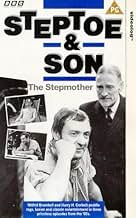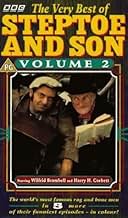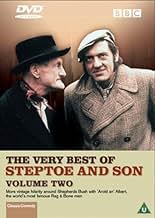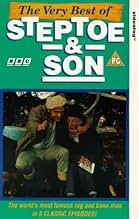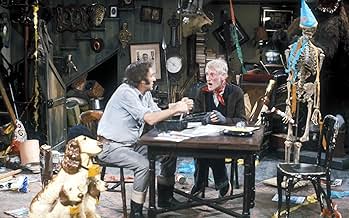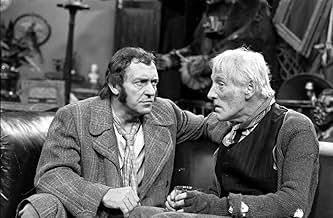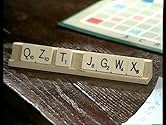Ajouter une intrigue dans votre langueBritish sitcom about a father-and-son rag-and-bone business in London. The intergenerational divide between the miserly Steptoe and his ambitious son results in comedy, drama, and tragedy.British sitcom about a father-and-son rag-and-bone business in London. The intergenerational divide between the miserly Steptoe and his ambitious son results in comedy, drama, and tragedy.British sitcom about a father-and-son rag-and-bone business in London. The intergenerational divide between the miserly Steptoe and his ambitious son results in comedy, drama, and tragedy.
- Récompenses
- 2 victoires au total
Parcourir les épisodes
Avis à la une
One of the saddest sights I ever saw on television was Wilfrid Brambell, close to tears on 'Nationwide' in 1982 following the sudden death of his 'Steptoe & Son' co-star Harry H.Corbett. The pairing of these great actors, combined with some wonderful scripts by Ray Galton and Alan Simpson, made 'Steptoe' a classic. I think viewers recognised the truthfulness of the situation; rag and bone man Harold desperately wanted to escape from his father's domination to begin a new life on his own, but couldn't because he loved the old man too much. When searching for comedy ideas, today's writers fall into the trap of thinking: "How can I shock the public?". 'Steptoe' did not set out to shock, yet did because it was so real. After a successful run in the '60's, it was revived in the '70's in colour, and these episodes are my favourites, particularly 'Divided We Stand' in which Harold and Albert tried to lead separate lives in the same house. The word 'timeless' is overused these days, but it definitely applies here.
This is a BBC sitcom that's set in Shepherd's Bush, West London. It's about a father and son who are rag-and-bone men. It ran from 1962-1974. There were also films, plays, documentaries and versions of the TV series made by other countries.
It's well-written and well-acted. There are many good performances from actors who only appear in one or two episodes each.
It's well-written and well-acted. There are many good performances from actors who only appear in one or two episodes each.
I love this type of simple comedy. No complicated stories or phrases or lines. I'm a young'un myself, growing up in such a degraded and unfunny society, so it's nice that a show that's pushing 70 years old is perfectly capable to make me genuinely laugh. As I said before, this level of simple comedy keeps me coming back, and I'm often quoting the show around people who have no idea what I'm talking about. For it's time, Steptoe was the most vulgar, offensive show on the box, yet is now considered the "elder statesman" by some today. I find it's not repeated on TV enough, with Divided we Stand being repeated on BBC Four only last October. Yet BBC Three is ok with repeating Bad Education's Christmas Special three times in one night. In conclusion, Steptoe was ahead of its time, portraying a very grim and off-beat picture of working class life.
"Steptoe and Son" set new standards for both comedy writing and acting. The quality of both has rarely been equalled and never surpassed. A lot has been written about the alleged animosity between the leading actors, Wilfred Brambell and Harry H. Corbett. To this day, those rumours remain just that. The recent biography on Corbett completely denies that there was ill feeling of any kind but admits that the two actors were never friends. For writers Ray Galton and Alan Simpson (R.I.P to a fine talent), they had a golden opportunity to write what they wanted after they split with Tony Hancock. Originally, they planned to write a sitcom for Frankie Howerd but BBC producer Duncan Wood rejected this for reasons to do with Howerd not being very popular at the time. That was when Galton and Simpson created one of the defining British sitcoms. After holding talks over what their new sitcom would be about, the ideas became more developed. No one but Wilfred Brambell and Harry H. Corbett could have played the characters of Albert and Harold Steptoe. Both actors were legitimately trained theatre performers and who had a lot of experience behind them when "Steptoe and Son" came into their lives. The characters are given so much depth, they are brought vividly to life. Galton and Simpson also blended drama into the comedy and the actors effortlessly created both funny and touching performances. Although there was always a bit of tragedy included in "Steptoe and Son," it never interfered with the comedy. It isn't every writer or actor who can combine comedy with drama. The series never needed much in the way of location shooting or lavish production values on order to create comedy gold. A lot of the time, the episodes played along the lines of being theatre which I would say is one of the best things that could have happened. Rag and Bone men, Albert and Harold Steptoe, are father and son. They usually inhibit an environment of conflict and tension. Relations between the two are usually strained, on account of the fact that they are always arguing. Harold has ambitions of various kinds so that he can escape his rather domineering, overbearing and devious father. Inevitably, Harold's plans don't usually bear fruition and usually because Albert sabotages his son's efforts and goals. The reason Albert behaves the way he does, is because he can't bear to be alone now that he is getting older. His wife passed away many years before whilst Harold was still a child. The responsibility of raising his son fell on Albert's shoulders and he was a neglectful father in more ways than one. Harold grew to resent his lack of upbringing due to his father. For Albert, his son was all he had left in the world. Underneath the hostility, father and son do care for one another. Occasionally, they are more united against someone else and the volatility is temporarily placed on hold. The series ran from 1962 until 1974, lasting 57 episodes. There was a gap of five years before "Steptoe and Son" resurfaced in 1970 and this time in colour. Most of the colour episodes from 1970 are missing but fortunately the black and white versions exist. I enjoy nearly all episodes but I think the series grew in quality in the episodes from 1970 to 1972. I can't stop laughing during those particular episodes and it's down to the brilliant on-screen chemistry between the two leads and the writing being of a high calibre. I would hazard a guess that Brambell and Corbett grew a bit tired of their respective characters by the time the series finished in 1974. They had had a great 12 year run and the viewing figures were something in the region of 20 million on a few occasions. The series won prestigious television awards and rightly so. There will never be another sitcom like "Steptoe and Son." It is a unique sitcom and its legacy is assured.
Although Steptoe and Son ran on British TV for twelve years it is one of those rare (maybe unique) examples of an idea which continued to develop and evolve rather than slide into stale repetition.
In its early years the series emphasised broad comedy. One well-remembered episode features Albert eating a meal while sitting in his bath, earning a rebuke from his son which became a national catchphrase: "You dirty old man!"
As time went by the characters became established and the writing began to emphasise the mutual dependency of two basically lonely men (Harold the batchelor and Albert the widower). Harold dreams of a better quality of life away from his father and constantly makes attempts to achieve something in his own right. His attempts are thwarted by his own lack of social standing and his father's scheming: if Harold joins a local theatre group, Albert joins too and becomes the star of the show.
Albert, for his part, fears losing his son and being abandoned in his old age. He will use any means (especially moral blackmail) to keep Harold at his side. More importantly he is far more realistic than Harold and sees that his attempts at social ambition are doomed.
In one of the most moving episodes an old girlfriend of Harold's reappears after many years. They still feel the same way about each other and plan to marry. Finally Harold can break away from the old man. Naturally Albert has other ideas, but at the climax of the show it is the girl who ends the relationship, telling Harold he is already married.
The performances of Wilfrid Brambell and Harry H Corbett never faltered through the show's run. Galton and Simpson produced scripts of wit and insight and they performed with great skill and subtlety. This is a show where you laugh while recognising the truth and basic sadness of the situation in which the characters live.
In its early years the series emphasised broad comedy. One well-remembered episode features Albert eating a meal while sitting in his bath, earning a rebuke from his son which became a national catchphrase: "You dirty old man!"
As time went by the characters became established and the writing began to emphasise the mutual dependency of two basically lonely men (Harold the batchelor and Albert the widower). Harold dreams of a better quality of life away from his father and constantly makes attempts to achieve something in his own right. His attempts are thwarted by his own lack of social standing and his father's scheming: if Harold joins a local theatre group, Albert joins too and becomes the star of the show.
Albert, for his part, fears losing his son and being abandoned in his old age. He will use any means (especially moral blackmail) to keep Harold at his side. More importantly he is far more realistic than Harold and sees that his attempts at social ambition are doomed.
In one of the most moving episodes an old girlfriend of Harold's reappears after many years. They still feel the same way about each other and plan to marry. Finally Harold can break away from the old man. Naturally Albert has other ideas, but at the climax of the show it is the girl who ends the relationship, telling Harold he is already married.
The performances of Wilfrid Brambell and Harry H Corbett never faltered through the show's run. Galton and Simpson produced scripts of wit and insight and they performed with great skill and subtlety. This is a show where you laugh while recognising the truth and basic sadness of the situation in which the characters live.
Le saviez-vous
- AnecdotesWilfrid Brambell was only 49 when he began playing Albert Steptoe, who was supposed to be 63 when the series began.
- GaffesThe physical positioning of the Steptoe's outside toilet varies over the course of the series: sometimes it is plumbed in facing the yard gates, at other times it's rotated to face the wall.
- Citations
[repeated line]
Harold Steptoe: You dirty old man!
- ConnexionsAlternate-language version of Stiefbeen en zoon (1963)
Meilleurs choix
Connectez-vous pour évaluer et suivre la liste de favoris afin de recevoir des recommandations personnalisées
Détails
- Date de sortie
- Pays d’origine
- Langue
- Aussi connu sous le nom de
- Степто и сын
- Lieux de tournage
- Stable Way, Kensington, Londres, Angleterre, Royaume-Uni(Junkyard exteriors)
- Société de production
- Voir plus de crédits d'entreprise sur IMDbPro
- Durée45 minutes
- Couleur
- Mixage
- Rapport de forme
- 1.33 : 1
Contribuer à cette page
Suggérer une modification ou ajouter du contenu manquant

Lacune principale
By what name was Steptoe and Son (1962) officially released in India in English?
Répondre
